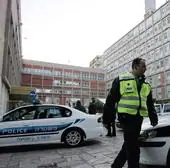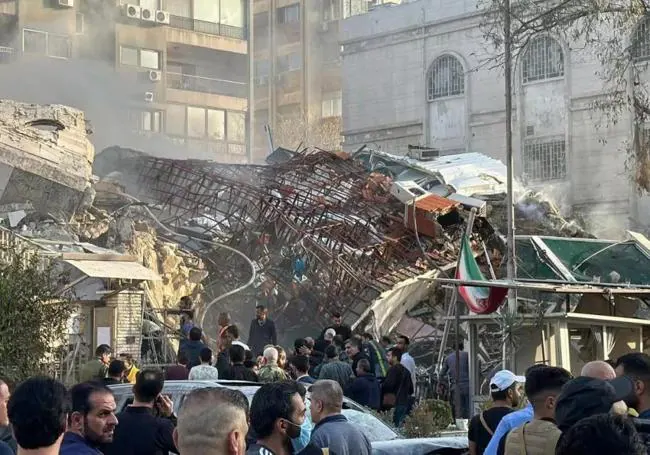A missile attack destroyed the Iranian embassy in the Syrian capital this Monday, causing at least thirteen deaths – according to the latest balance provided this Tuesday by Tehran – and an unknown number of injuries. Emergency teams were making efforts last night to search for possible victims among the rubble of the building, literally “crushed” by the explosion. Among the deceased is a military man of utmost importance in the Iranian organizational chart, Brigadier General Mohamed Reda al Zahedi, senior commander of the Revolutionary Guard and head of military operations of the elite Quds force in Syria and Lebanon at least until 2016. .
Damascus became a chaos of sirens and disbelief at the nature of the attack, which occurred around 5:30 p.m. and generated a huge cloud of smoke over Mazeh, the fortified neighborhood in the west of the capital where the legation is located. The Government of Tehran accused Benjamin Netanyahu's Executive, which last night had not officially commented on whether his aircraft fired the rockets over Damascus. The local media limited themselves to talking about alleged authorship from Tel Aviv.

The bombing represents an unusual step in the war crisis in the Middle East triggered by the massacre perpetrated by Hamas on October 7 against the kibbutzim near the Strip. Military sources told the Reuters agency that, if Iranian assumptions were confirmed, the entire region would find itself facing a possible and “surprising escalation of the conflict” that would “confront” Tel Aviv with the Tehran regime and its allies. Iranian Foreign Minister Hossein Amir-Abdollahian called the attack “a breach of all international conventions” and noted that his country will hold Israel responsible for the “consequences.”
The Syrian Observatory for Human Rights indicated that at least one rocket hit the diplomatic complex and blew up a building attached to the main one. The surroundings were apparently left intact, which could point to selective action. In the images distributed by the agencies it is observed how the building is converted into a large mass of cement, iron and bricks, in front of which the Iranian flag flies. The ambassador's residence would be located there, and he would have been unharmed along with his family.
In fact, the diplomat, Hossein Akbari, was able to see how the events occurred from the window of his office, located in the other building, and added that the ayatollah regime will respond with “harshness.” According to his version, there were seven dead; That is, all the people who were supposedly in the annex at the time of the brutal explosion, although he added that the exact number will not be known until the inspection of the rubble is completed. The ambassador lashed out at Netanyahu, whom he accused of having “completely lost his mental balance due to the failures in Gaza.”

An Iranian flag flies next to the rubble of the diplomatic building in Damascus.
AFP
The Axis of Resistance
In addition to General Al-Zahedi, his second in command and other advisors of the Revolutionary Guard were killed in the explosion. Some versions revealed that they were holding a meeting with members of the Islamic Jihad, but this information was not confirmed. On January 20, Israel already destroyed a building used by the Revolutionary Guard in Damascus. In this selective attack, a commander and his assistant died.
The keys
Assault
The ambassador assured that F-35 fighters intervened in the attack and fired six missiles.
Debris
The explosion completely affected a building attached to the diplomatic complex, which was “crushed.”
Iranian regime
“It is a breach of all international conventions,” says the Foreign Minister.
Akbari assured that Monday's bombing was carried out by F-35 fighter planes. They reportedly fired six missiles, but most were intercepted by anti-aircraft defenses, judging by the detonations that witnesses said they heard. The SANA agency confirmed that “hostile targets” had been neutralized by Syrian defenses.
Iran and Israel have remained engaged in a covert war since the Hamas attacks. This militia is part of the so-called Axis of resistance led by the Tehran regime and which also includes Hezbollah, the Houthi rebels and Islamic Jihad. It so happens that the Iranian Foreign Minister received the Secretary General of the Palestinian Jihad, Ziad Najalah, on Saturday, four days after he also met with the leader of Hamas, Ismael Haniye. As a rule, Tel Aviv does not usually report attacks on Syrian soil, but it has admitted to repeatedly hitting Iranian-backed militia groups operating in that country and which it describes as “terrorists.” Its air force attacked a dozen Hezbollah cells in Lebanon this Monday.
#Iran #accuses #Israel #attack #embassy #Damascus #left #dead